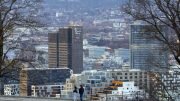The Norwegian government is continuing measures to reduce the infection rate and prevent the virus’s contagious variant from spreading but is relaxing restrictions for children, young people, and workplaces.
The national measures implemented on January 18 will be continued until mid-February.
“The national measures have been effective, and the rate of infection is falling in Norway. But it must fall even further, and we cannot take any chances that could lead to the more contagious variants of the virus spreading. Therefore, we are continuing the national measures until mid-February,” Minister of Health and Care Services Bent Høie said on Saturday.
Very strict measures were implemented in 10 municipalities (ring 1 municipalities) on Saturday, January 23, and strict measures in 15 further municipalities (ring 2 municipalities) on Sunday, January 24, to prevent the contagious variant of the virus from spreading in Eastern Norway.
These measures will be continued until and including Tuesday, February 2, at the request of the municipalities concerned.
From Wednesday, February 3, the measures for the central municipalities in Eastern Norway will be changed and encompass fewer municipalities.
The government will make children, young people, and workplaces its top priority. The measures that apply in the ring 1 and ring 2 municipalities will remain in force until and including February 10.
“We now have a better overview, but the situation remains uncertain. Infection tracing and follow-up in the municipalities concerned will give us an even better overview in the days ahead,” Høie noted.
Children and young people top priority
The government is prioritizing easing the restrictions for children and young people. Being able to attend kindergarten and school is important for play and learning, as well as to prevent loneliness and isolation.
“I am very pleased that we can now relax the strict measures a little, and we are prioritizing children, young people and workplaces.
“It is important that we continue to push the infection rate down and stay in control. This will help make this winter and spring easier for all of us,” Minister of Education and Integration Guri Melby said.
“The vaccinations are underway, and the days are starting to get longer and lighter, and I hope that relaxing these restrictions will also help to brighten up our lives a bit in the time ahead,” Melby added.
The easing of restrictions means that schools and kindergartens in ring 1 and ring 2 municipalities will now return to the “yellow” level.
That will give the municipalities time to consider whether the local situation requires “red”-level measures.
University vocational college premises will remain closed for students and teaching activities, and planned events must be postponed or take place digitally.
However, exceptions may now be made for students who depend on access to premises to carry out experiments or skills training to avoid delays to their studies.
Meeting friends and more active recreational activities
Being able to meet up with friends and do recreational activities is important to many children and young people, particularly in these challenging times.
The government will now allow children and young people under the age of 20 in ring 1 and ring 2 municipalities to do organized sports and recreational activities.
The national rules apply to ring 2 municipalities.
“I am pleased that we can now make children and young people’s everyday lives a bit easier. In ring 1 municipalities, we are now allowing children and young people under the age of 20 to do organised sports and recreational activities.
“I hope that be able to go to football, handball, or choir practice will ease the burden on many children and young people living in these municipalities.
“We are also easing the rules concerning visitors at home, and people can now have up to five guests. This also applies to young people,” Minister of Children and Families Kjell Ingolf Ropstad said.
International sports events in Norway
There is still a major risk of imported infection and of mutated virus variants spreading.
“That means that we must be restrictive when it comes to granting exemption from entry and quarantine rules for international sports events held in Norway,” the government noted in its press release.
The government has decided to extend the recommendation to postpone all league matches for a further two weeks until mid-February until an overall assessment of the national measures can be made.
Due to Norway’s entry restrictions, the government has decided to repeal the exemptions for international football and handball events and for World Cup Nordic skiing, alpine skiing, and biathlon events.
The exemption will not be reintroduced until the government has conducted a new assessment in mid-February.
Stricter entry rules
The government is tightening restrictions on entry. Persons who have a medical certificate showing that they have had COVID-19 have so far been exempt from the requirements for entry quarantine, a negative test, and testing on arrival.
False certificates of previous infection with COVID-19 entail a greater risk of imported infection, including of new and more contagious variants.
For this reason, these exemptions will no longer apply.
A certificate of this kind will no longer exempt people from a compulsory test at the border or entry quarantine.
To be exempt from the requirement for a negative test taken no later than 24 hours before arrival in Norway and quarantine, people must have documentation of previous infection with COVID-19.
Exemption from quarantine will only be granted to holders of Norwegian certificates showing previous infection with COVID-19.
This requirement enters into force at midnight (00:00) on Sunday, January 31.
Changes in ring 1 and ring 2 municipalities
From and including February 3, ring 1 will be reduced from 10 to 3 municipalities: Nordre Follo, Oslo, and Ås.
From and including February 3, ring 2 will comprise: Asker, Bærum, Enebakk, Frogn, Indre Østfold, Lillestrøm, Lunner, Lørenskog, Moss, Nesodden, Nittedal, Rælingen, Vestby, and Våler.
From and including February 3, the following municipalities will no longer be in the ring 2 group: Aurskog-Høland, Drammen, Horten, Lier, Marker, Rakkestad, Råde, and Skiptvet.
The national measures will apply to these municipalities, along with any local regulations adopted.
The following measures apply to ring 1 during the period from February 3 to February 10
Applies to the following municipalities: Nordre Follo, Oslo, and Ås
Kindergartens, schools, universities, university colleges, tertiary vocational colleges
- The “yellow” level applies to schools and kindergartens, as in the rest of the country.
- Local assessments must be made in accordance with the infection situation, meaning that the municipality – as the infection control authority – may decide to implement the “red” level where necessary based on its assessment of the infection situation.
- The premises of universities, university colleges, and tertiary vocational colleges, and for adult education at primary and lower and upper secondary level, and adults taking education pursuant to the Introduction Act and Integration Act, as well as for course activities under the auspices of adult learning associations and the SkillsPlus scheme, will be closed to all pupils and students. Employees comply with the rules that otherwise apply to workplaces. All teaching activities and planned events must be postponed or take place digitally.
- The premises of schools approved pursuant to Chapter 6A of the Independent Schools Act will not be closed to pupils. Schools with boarding facilities must follow the rules and recommendations for folk high school, while schools without such facilities follow the rules and recommendations for upper secondary education.
- Universities, university colleges, and tertiary vocational colleges may make exemptions from the requirement to keep their premises closed if access to the premises is essential for students who are dependent on carrying out experiments or skills training that cannot be carried out digitally and these activities are necessary to maintain progress in their studies.
Events
- All events outside the home are banned, both indoors and outdoors, with the exception of burial and cremation ceremonies.
- Digital events where a maximum of five people are present, as well as necessary production personnel, are permitted.
Sports and recreational activities
- Children and young people under the age of 20 may now do organized sports and recreational activities.
- Recreational sports and other organized sports and recreational activities for adults are not permitted, but organized training for top-level athletes is permitted.
- Swimming pools, water parks, spas, hotel swimming pools, etc., may open for school swimming classes, organized swimming courses and organized swimming training for people under the age of 20 and professional athletes, and for rehabilitation and individual treatment.
- Public venues and enterprises at which organized cultural, sports, and recreational activities take place may stay open for:
- Children and young people under the age of 20
- Outdoor activities for adults
- Organized training for top-level athletes
Workplaces
- Everyone who can work from home must do so. Employers must ensure that employees work at home as far as practically possible. Employers must be able to document that the employees have received information about how this is to be done in the enterprise. Travel to work must be deemed necessary. The requirement to work from home will nonetheless apply to those for whom this is possible.
Shops
Individual shops not located in a shopping center may open. Shopping centers and department stores must remain shut in ring 1, with the following exceptions:
- grocery shops, including kiosks, health food shops, and other shops that mainly sell food
- outlets that mainly sell animal feed and other necessary items for pets and livestock
- pharmacies
- surgical stores
- opticians
- bars, restaurants, etc.
- Vinmonopolet shops
- businesses such as hairdressers, skincare salons, tattoo parlors, etc.
- health-related businesses such as physiotherapists, chiropractors, chiropodists, etc.
- petrol stations
- sales activities in connection with agriculture and animal production
- warehouse and wholesale sections of builders’ merchants that sell goods to tradespeople etc.
Shops may stay open for the collection of ordered and pre-paid goods if this can be done in a way that ensures good infection control.
Restaurants, cafés, bars
- Restaurants, cafés, and bars may re-open.
- The rule that these establishments cannot serve alcohol is upheld.
The following places and enterprises must remain shut:
- Fitness centers
- Amusement parks, bingo halls, gaming arcades, playrooms, bowling alleys, and similar entertainment and recreational activity venues
- Museums
- Cinemas, theatres, concert venues, and similar cultural and entertainment venues
- Other public venues and businesses that organize cultural, entertainment, or recreational activities that gather people indoors The following exceptions apply:
- Swimming pools, water parks, spas, hotel swimming pools, etc., may open for school swimming classes, organized swimming courses and organized swimming training for people under the age of 20, and for rehabilitation and individual treatment.
- Libraries
- Public venues and enterprises may stay open for outdoor recreational activities for adults.
- Public venues and enterprises at which organized cultural, sports, and recreational activities take place may stay open for children and young people under the age of 20, outdoor activities for adults, and organized training for top-level athletes, however in such a way that recreational activities for others do not take place in these venues.
Recommendations
- The recommendation on not receiving visitors at home no longer applies. The national recommendations apply. That means limiting social contact and having no more than five guests in addition to household members. Children who attend kindergartens and primary schools can receive visits from other children in their cohort.
- No one should travel unless necessary. Travel to work must be deemed necessary. The requirement to work from home will nonetheless apply to those for whom this is possible.
- Inhabitants of Nordre Follo are advised not to travel to a second home outside the municipality. This recommendation has been lifted for residents in other ring 1 municipalities. However, you should only travel with other members of your household and not receive visitors. Buy everything you need in your own municipality before you leave. The local shop in the municipality where your cabin is located should only be used if strictly necessary. Take extra infection control precautions, such as going to the shop at times when it is less busy. Do not go to shops, bars, and restaurants, or other places with many people in the municipality where your cabin is located. Keep your distance from others on ski trails, ski lifts, and on walks. Check which advice and rules apply in the municipality where your cabin is located and comply with them.
- The municipalities and county authorities should continue to implement stricter public transport measures, which could, for example, entail only using 50% of the capacity on the means of transport.
- One-to-one businesses, such as hairdressers, should continue to implement stricter measures such as requiring face masks to be worn in situations where it is impossible to keep a distance of one meter or reduce or temporarily suspending services that entail close face-to-face contact.
- It is recommended that the municipalities and the inhabitants of the municipalities concerned consider testing on day 7-10 of the infection quarantine period. Consideration should be given to whether household members of close contacts should also quarantine if infection with the mutated variant of the virus is suspected.
Duty to wear a face mask
- A face mask must be worn when it is not possible to keep a distance of at least one meter from people other than members of your household, except when quickly passing people.
- A face mask must be worn in public areas, such as shops, on public transport and indoor station areas, in restaurants when picking up a takeaway, in common areas in shopping centers if they are open because pharmacies and grocery shops are located there, and at places of worship or similar venues in connection with burial and cremation ceremonies.
- The duty to wear a face mask applies correspondingly to employees in places where it is not possible to keep a distance of at least one meter from visitors. This does not apply to employees in places where other infection control measures have been implemented for them, such as the use of visors, partitions, etc.
- Passengers must wear a face mask in taxis. Face masks must be put on before the passenger enters the taxi and must not be taken off until the journey has ended and the passenger has left the taxi. The duty to wear a face mask applies correspondingly to the driver when there are passengers in the taxi.
- The duty to wear a face mask does not apply to children under the age of 12 or those who cannot wear a face mask for medical or other reasons.
All municipalities may implement strict recommendations and rules based on the local infection situation.
The following measures apply to ring 2 during the period from February 3 to February 10
Applies to the following municipalities: Asker, Bærum, Enebakk, Frogn, Indre Østfold, Lillestrøm, Lunner, Lørenskog, Moss, Nesodden, Nittedal, Rælingen, Vestby and Våler.
Kindergartens, schools, universities, university colleges, and tertiary vocational colleges
- The yellow level in the traffic light model applies to schools and kindergartens, as in the rest of the country.
- Local assessments must be made in accordance with the infection situation, meaning that the municipality as the infection control authority may decide to implement the red level where necessary based on its assessment of the infection situation
- The premises of universities, university colleges, and tertiary vocational colleges, and for adult education at the primary and lower and upper secondary level, and adults taking education pursuant to the Introduction Act and Integration Act, as well as for course activities under the auspices of adult learning associations and the SkillsPlus scheme, will be closed to all pupils and students. Employees comply with the rules that otherwise apply to workplaces. All teaching activities and planned events must be postponed or take place digitally.
- The premises of schools approved pursuant to Chapter 6A of the Independent Schools Act will not be closed to pupils. Schools with boarding facilities must follow the rules and recommendations for folk high school, while schools without such facilities follow the rules and recommendations for upper secondary education.
- Universities, university colleges, and tertiary vocational colleges may make exemptions from the requirement to keep their premises closed if access to the premises is essential for students who are dependent on carrying out experiments or skills training that cannot be carried out digitally and these activities are necessary to maintain progress in their studies.
Sports and recreational activities
- Organized sports and recreational activities are permitted for children and adults.
- Gyms may open for persons that reside in the municipality. The gyms must assess how they can implement necessary systems to ensure compliance.
- School swimming classes, organized swimming courses and training for children and people under 20 and swimming training for top-level professional athletes.
- Libraries are open.
- Public venues and enterprises at which organized cultural, sports, and recreational activities take place may stay open for:
- Children and young people under the age of 20
- Outdoor activities for adults
- Organized training for top-level athletes
- Adults are recommended not to participate in organized activities indoors, but to exercise outdoors if it is possible to keep a good distance. Top-level athletes can train as normal, including indoors.
Workplaces
- Everyone who can work from home must do so. Employers must ensure that employees work at home as far as practically possible. Employers must be able to document that the employees have received information about how this is to be done in the enterprise. Travel to work must be deemed necessary. The requirement to work from home will nonetheless apply to those for whom this is possible.
Shops
Shopping centers and department stores must remain shut in ring 2, with the following exceptions for enterprises located in shopping centers:
- grocery shops, including kiosks, health food shops, and other shops that mainly sell food
- outlets that mainly sell animal feed and other necessary items for pets and livestock
- pharmacies
- surgical stores
- opticians
- bars, restaurants, etc.
- Vinmonopolet shops
- businesses such as hairdressers, skincare salons, tattoo parlors, etc.
- Health-related businesses such as physiotherapists, chiropractors, chiropodists, etc.
- petrol stations
- sales activities in connection with agriculture and animal production
- warehouse and wholesale sections of builders’ merchants that sell goods to tradespeople etc.
Shops may stay open for the collection of ordered and pre-paid goods if this can be done in a way that ensures good infection control.
Restaurants, cafés, bars
- The rule that these establishments cannot serve alcohol is upheld.
The following places and enterprises must remain shut:
- Amusement parks, bingo halls, gaming arcades, playrooms, bowling alleys, and similar entertainment and recreational activity venues
- Museums
- Cinemas, theatres, concert venues, and similar cultural and entertainment venues
- Other public venues and businesses that organize cultural, entertainment, or recreational activities for people indoors
- Swimming pools, water parks, spas, hotel swimming pools, etc., must remain shut. The following exceptions apply:
- School swimming classes, swimming courses and training for children and people under the age of 20, and swimming training for professional athletes. Rehabilitation activities provided by an organizer to individuals or small groups are also permitted. This also applies to other individual treatments that you can book an appointment for where being in a pool forms part of the treatment.
Recommendations
- The national recommendation on visitors at home applies. This means limiting social contact, and having no more than five guests in addition to household members. Children who attend kindergartens and primary schools can receive visits from other children in their cohort.
- No one should travel unless necessary. Travel to work must be deemed necessary. The requirement to work from home will nonetheless apply to those for whom this is possible.
- The recommendation to avoid traveling to a second home outside the municipality you live in, no longer applies. However, you should only travel with other members of your household and not receive visitors. Buy everything you need in your own municipality before you leave. The local shop in the municipality where your cabin is located should only be used if strictly necessary. Take extra infection control precautions, such as going to the shop at times when it is less busy. Do not go to shops, bars, and restaurants, or other places with many people in the municipality where your cabin is located. Keep your distance from others on ski trails, ski lifts, and on walks. Check which advice and rules apply in the municipality where your cabin is located and comply with them.
- Based on the local risk of infection, the municipalities and county authorities should assess whether the current enhanced measures that apply to public transport should be continued, for example, only using 50% of the capacity on the means of transport.
- One-to-one businesses, such as hairdressers: Based on the local risk of infection, the municipalities should assess whether the current enhanced measures should be continued. Examples include requiring face masks to be worn in situations where it is not possible to keep a distance of one meter or reducing or temporarily suspending services that entail close face-to-face contact.
- It is recommended that the municipalities and the inhabitants of the municipalities concerned consider testing on day 7-10 of the infection quarantine period. Consideration should be given to whether household members of close contacts should also quarantine if infection with the mutated variant of the virus is suspected.
Duty to wear a face mask
- A face mask must be worn when it is not possible to keep a distance of at least one meter from people other than members of your household, except when quickly passing people.
- A face mask must be worn in public areas, such as shops, on public transport and indoor station areas, in restaurants when picking up a takeaway, in common areas in shopping centers if they are open because pharmacies and grocery shops are located there, and at places of worship or similar venues in connection with burial and cremation ceremonies.
- The duty to wear a face mask applies correspondingly to employees in places where it is not possible to keep a distance of at least one meter from visitors. This does not apply to employees in places where other infection control measures have been implemented for them, such as visors, partitions, etc.
- Passengers must wear a face mask in taxis. Face masks must be put on before the passenger enters the taxi, and must not be taken off until the journey has ended and the passenger has left the taxi. The duty to wear a face mask applies correspondingly to the driver when there are passengers in the taxi.
- The duty to wear a face mask does not apply to children under the age of 12, or to those who are unable to wear a face mask for medical or other reasons.
All municipalities may implement strict recommendations and rules based on the local infection situation.
Source: Ministry of Health and Care Services / Ministry of Children and Families / Ministry of Education and Research / #Norway Today / #NorwayTodayNews
Do you have a news tip for Norway Today? We want to hear it. Get in touch at info@norwaytoday.no





Leave a comment